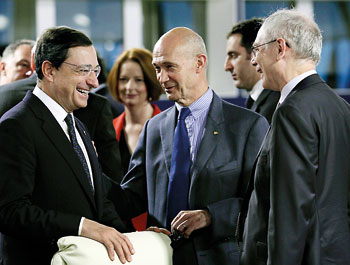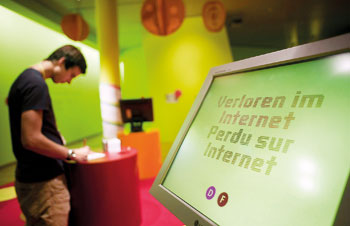CANNES, France, Nov 4, 2011
The world's top exporters led by China and Germany will attempt to stabilise a global economy knocked off kilter by the European debt crisis with a pledge Friday at the G20 summit to boost domestic consumption.
 |
| New President of the European Central Bank (ECB) Mario Draghi (L) speaks with director-general of the World Trade Organization (WTO) Pascal Lamy (C), and President of the European Council, Herman Van Rompuy before the start of a meeting on the second day of the G20 Summit in Cannes, France November 4, 2011. REUTERS |
 |
| A man visits the exhibition “Warning: Communicating harms'' at the Museum of Communication in Bern. The exhibition is dedicated to the idea that an excess of information can be dangerous for one's health. The exhibition will be open to the public from November 4 to July 15, 2012. Computer screen at right reads '' lost on the internet”. AFP |
Even as Greece dithered over a planned referendum on an EU bailout package for the highly indebted state, China warned that the eurozone crisis will persist and its negative impact expand.
With his job on the line as the Greek parliament takes a confidence vote Friday, Greek Prime Minister George Papandreou said he was ready to drop a plan to put the rescue package to a popular vote which incensed European leaders.
To ringfence the European problem, the world's biggest economies will also agree at the second and final day of the meeting to bolster the International Monetary Fund's resources to help tackle the debt crisis.
Non-EU leaders lectured Europe at the opening of the G20 summit, with Russian President Dmitry Medvedev saying: “In my opinion, our partners' actions need to be much more dynamic and decisive to bring about order.”US President Barack Obama also said the G20 leaders' top priority was to conquer the European crisis, which has spooked markets and which Japanese Prime Minister Yoshihiko Noda warned risks provoking a “chain reaction” through the global economy.
“The most important aspect of our task is to resolve the financial crisis here in Europe,” said Obama after meeting summit host French President Nicolas Sarkozy at the start of the meeting in Cannes.
Papandreou triggered a renewed bout of market turmoil this week when he said Athens would put a rescue package agreed only last week to a referendum.
Already on Wednesday, France and Germany had tried to strong-arm Athens into accepting an EU bailout package as the Greek government tottered on the brink of collapse.
Sarkozy and his German counterpart Chancellor Angela Merkel summoned Papandreou to Cannes ahead of the G20 meeting to vent their fury over his high-risk referendum gambit.
They warned Greece would not receive “one more cent” of the International Monetary Fund and EU's next planned eight-billion euro ($11 billion) aid installment unless he won the referendum scheduled for December 4.
Without the EU-IMF funds, Greece will run out of money within weeks and could face a messy debt default which would force it to leave the European single currency bloc.
Nervous investors sent Italy's long-term borrowing costs to 6.4 percent, nearing levels unsustainable over the long-term. Stock markets tumbled before being boosted by an unexpected rate cut by the European Central Bank.
The warning seemed to work and Papandreou -- back in Athens Thursday and facing a confidence vote in parliament -- said he was prepared to drop plans for the referendum which had sent world markets into a tailspin. |



